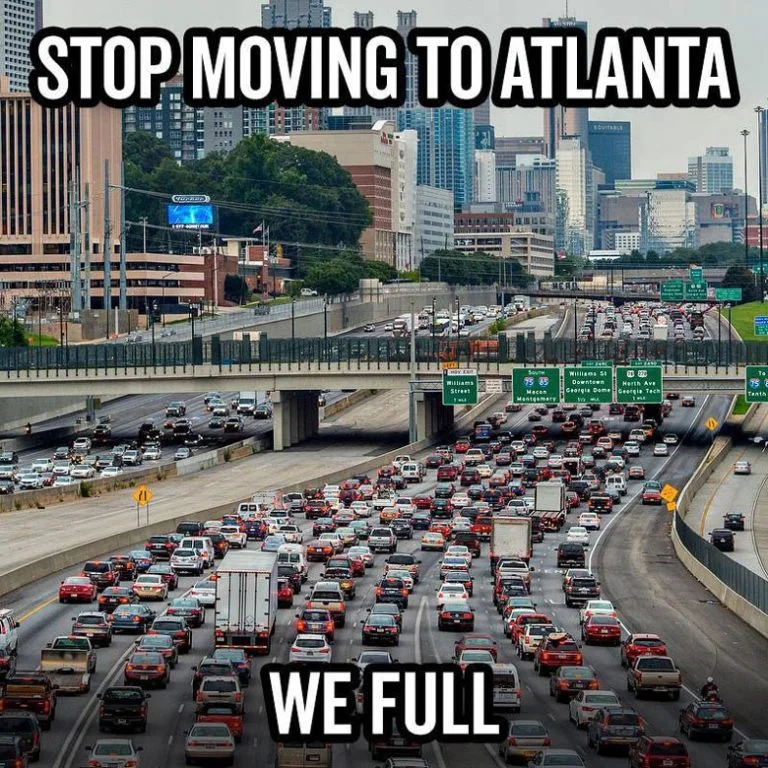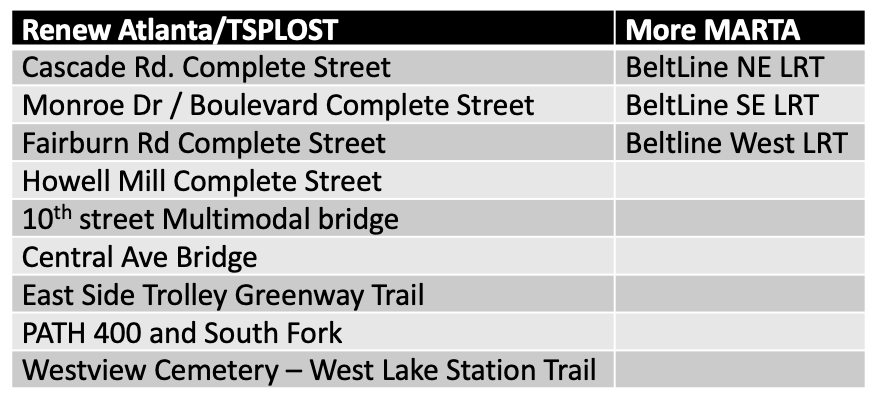Our population has doubled to 1 million people living within Atlanta’s city limits. Cars, MARTA buses, and delivery vans fill our roads in an endless “rush hour” lasting most of the day. Bikes and scooters squeeze between gaps in the mosh pit of vehicles fighting to block everyone else's movement forward. Dockless scooters have been banned for years but our sidewalks are dotted with ghost bikes memorializing Atlantans we lost to our streets.
How did we get here?
Atlanta has spent the last 70 years optimizing the way it breathes in as many cars as possible in the morning, storing them during the day, and flushing them out to go home at night. A public transportation system exists but it is severely underfunded and mired in much nimbler personal car traffic. Today, traveling just 3 miles in a car or bus during rush hour can take anywhere from 20 to 45 minutes.
Atlantans and our elected officials understand that we need to use our limited public space more efficiently. This means reallocating space dedicated for personal vehicles to space for more dense forms of transportation like bicycles, buses, and trains.
Our city council proposed three transportation project lists to begin this reallocation. These lists intentionally placed projects of different modes around the city to encourage as many Atlantans to vote. Unfortunately, the disconnected locations of these projects failed to form bike, bus, or train networks and so failed to solve the majority of Atlanta’s current or future transportation problems. Nevertheless, city residents were looking for any recourse they could get and voted overwhelmingly in favor of all three lists.
When Atlantan’s voted to approve Renew Atlanta and TSPLOST in 2015 and 2016, the bills used a list of 700+ transportation projects valued at $940M. After the vote was won, this list was reduced to 470 projects to fit a budget of $530M. Similarly, More MARTA used a 31-project list of $11.5B and was reduced to only 18 projects to fit a budget of $2.7B.
Atlanta now has a history of cutting back transportation project lists due to rising construction costs, expanding project scopes, and lower than anticipated sales tax revenues. We face the additional problem of our city spontaneously dedicating transportation funds to projects that are outside of the scope of the original project lists. Most recently the $20M Piedmont Park land acquisition, the $33M Northside pedestrian bridge, and the Emory Village annexation that added roughly $300M to the Clifton Corridor.
What is going to happen
Understanding how our city operates, how Atlantans feel, and what is happening in transportation, here are some headlines we are probably going to see.
The BeltLine loop that never was
Projects cut form Renew Atlanta/TSPLOST and More MARTA
Due to rising construction and land costs Renew Atlanta/TSPLOST and More MARTA projects are cut even further. Atlantans are left with far fewer protected bike lanes than were promised in 2016.
The Clifton Corridor has been completed between Lindbergh and Emory. Unfortunately, it has failed to go further because it was not as “shovel ready” as city officials stated. Negotiations with homeowners to cut and cover through their backyards proved to be prohibitively more expensive than originally predicted.
After dedicating most of the More MARTA money towards the 4 mile Clifton Corridor, MARTA changed Campbellton Road’s light rail to bus rapid transit. Citizens living around Campbellton are happy their buses are not stuck in traffic but they are still asking for sidewalks to get to the bus stop.
These projects and the additional funds required for MARTA to maintain bus frequency due to high traffic conditions left no money for rail on the BeltLine.
Despite thousands of community meetings and tens of billions of dollars in economic development the BeltLine remains far from the promised loop of transit connecting 45 neighborhoods. Instead, the BeltLine has become an overcrowded sidewalk in the form of a “J” connecting Washington Park with Piedmont Park. Rental costs and home prices are sky high around the only safe corridor in the city to bike or ride a scooter.
Atlantans Reject All Transportation Funding
For decades, Atlantans have invested their time to attend and give feedback at public meetings about complete streets and rail, but instead of greater mobility, in return, they’ve gotten long delays or the removal of their favorite projects. The city’s overpromising has broken Atlantan’s trust.
The Renew Atlanta/TSPLOST funding ended in 2021 and another round of transportation funding was presented. The city council used an even larger project list to “get Atlantans to vote”. Multiple local organizations, reinforced by angry new members, publicly opposed any additional transportation funding despite the increasing traffic and $1B+ infrastructure backlog at the time (now $5B). The city’s transportation infrastructure has fallen into even greater disrepair due to higher use and our leader’s continued inability to pass transportation funding.
scooter ban has no impact on deaths
In 2019, 63% of metro Atlanta drove less than 15 miles in an entire day. This was almost halved to 8 miles a day within city limits. As our population grew, car congestion increased. This slowing of car and MARTA bus trips made bicycles and scooters attractive alternatives to cars. As bicycle traffic increased without the properly separated infrastructure, more Atlantans were forced to ride bikes and scooters in the same space as cars. The difference in mass and speed resulted in a steady increase in fatalities.
The early rise in deaths led the mayor to ban dockless sharable devices. But, the genie was already out of the lamp for scooters. Sharable scooter companies simply switched to long term rentals to be charged at home. More Atlantan’s avoided rental agreements by buying their own devices from Amazon for under $400. The city was unable to limit the speed of the purchased devices which now weigh less than 10 pounds and can travel up to speeds of 100 mph. Scooters, bikes and many other forms of light electric mobility devises poured on to Atlanta’s streets increasing trips 10x every year for the next decade.
Unfortunately, there are still no barriers to separate a 2-ton vehicles going 45 mph from a 10-year-old on a bike. Bike and scooter deaths have become common.
Inequality reaches all time high
Atlantans still need a car to accomplish the basic needs of a livable city like work, education, healthcare, child care, recreation, and shopping. Even if a car is paid off in 2019, we still had to spend over $2000 a year to keep it legally on the road. Families spend more on car travel than they ever have before. Cars are Atlantan’s second largest expense which has made housing even less affordable. MARTA is not an option because buses are stuck in more traffic and travel even less frequently. Rich suburban Atlantans move in to the city to avoid longer drive times pushing housing prices higher. Atlanta is a city for the rich and the poor have been forced out.
Autonomous cars are here, traffic is worse
Autonomous vehicles were introduced to Atlanta 10 years ago but they remain out of reach for the majority of Atlantans. Autonomous vehicle manufacturers and fleet companies assume the risk of piloting their vehicles on our streets. Since they are still mixed in with human driven vehicles, their speeds are restricted to well under the speed limit to avoid at fault collisions. Manufacturers, fleet companies, and the wealthy constantly lobby our mayor, our governor, and our city council for dedicated space in the form of lanes, campuses and high pedestrian fences.
Additionally, with the increased ability to get anything delivered, a greater number of delivery vehicles with irregular stops will enter our streets. Both autonomous and delivery vehicles have further slowed our traffic and reduced dedicated space for bikes and buses.
Conclusion
Atlanta is headed for a future of congestion, deadly roads, and inequality. This doesn’t have to be our future.

